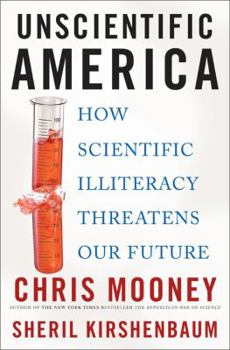Unscientific America: How Scientific Illiteracy Threatens our Future
Select Format
Select Condition 
Book Overview
Customer Reviews
Rated 5 starsTrades polemic finger pointing for positive and practical optimism
Unlike Mooney's previous The Republician War on Science, this book isn't a polemic and will unlikely offend anyone. Instead, in a rare move, for commentary non-fiction actually focus on what can be done about the problem rather than an overdose of mockery. Perhaps the most surprising was the books focus of the New Atheists (Richard Dawkins and such) as being a problem for science. The argument (that they create unnecessay...
0Report
Rated 5 starsBrief but compelling, balanced and informative argument
I thoroughly enjoyed this book. Unlike others' complaints, I praise its brevity. In fact, I thought the book was dense with useful stories and talking points but without belaboring them. This is a strength of the book--and indeed something the authors suggest that scientists should become better skilled at. Most scientists who have not actively thought about such issues as relationships between science and the media and religion...
0Report
Rated 5 starsA Personal Epiphany
For many years I wondered why there seemed to be a disconnect between what scientists were stating vs. what the public thought they were saying. Nowhere is this more true than with global warming (climate change). Climate change has been extensively researched and the overwhelming majority of climate scientists agree that the observed modern day global warming is unprecedented and is very likely caused by humans. Although...
0Report
Rated 5 starsA 'must' for any concerned about the unscientific paths America is charting ahead
UNSCIENTIFIC AMERICA: HOW SCIENTIFIC ILLITERACY THREATENS OUR FUTURE offers important assessments from a journalist and author and a scientist who join forces to explain how religious ideologies and a range of influences have collaborated to create a society where science and mainstream American beliefs diverge. This is a 'must' for any concerned about the unscientific paths America is charting ahead - and who seek to remedy...
0Report
Rated 5 starsThe things it focuses on provide the value
First of all, there WAS a Republican War on Science. Some of it has ended. Marc Morano is no longer working for Senator Inhofe, he's out promoting anti-science in a PR venue, where he should have been all along. Sarah Palin is no longer governor. George Bush is no longer president. There is a possiblity of reviving the Congressional Office on Science and Technology. Triana, slandered as the Gorecam by the Republicans, may...
0Report














